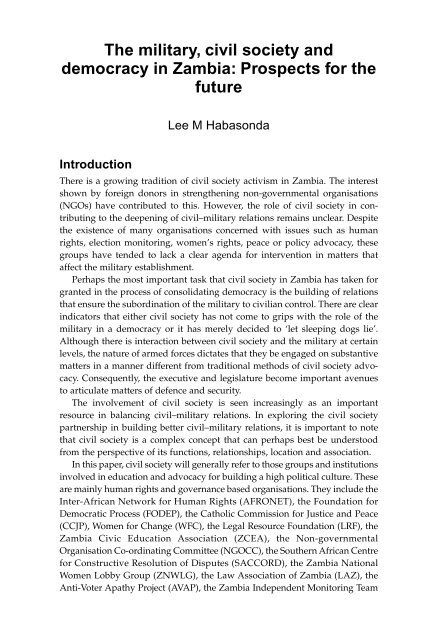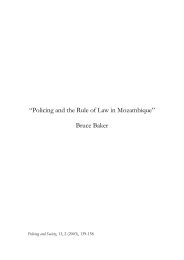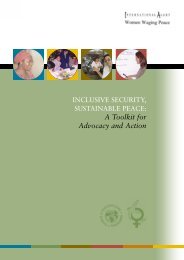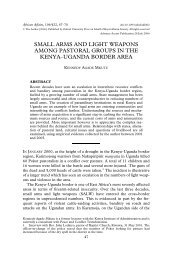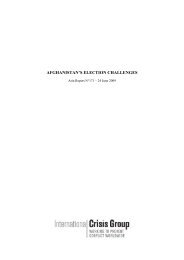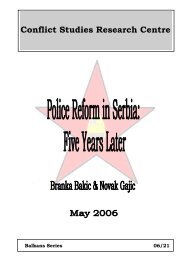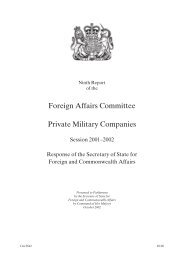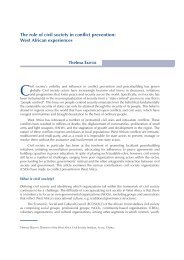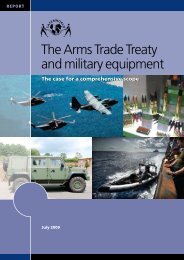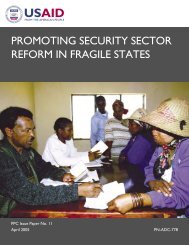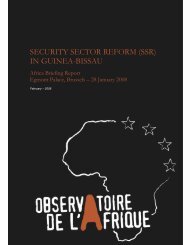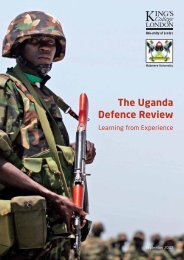The military, civil society and democracy in Zambia: Prospects for ...
The military, civil society and democracy in Zambia: Prospects for ...
The military, civil society and democracy in Zambia: Prospects for ...
You also want an ePaper? Increase the reach of your titles
YUMPU automatically turns print PDFs into web optimized ePapers that Google loves.
<strong>The</strong> <strong>military</strong>, <strong>civil</strong> <strong>society</strong> <strong>and</strong><br />
<strong>democracy</strong> <strong>in</strong> <strong>Zambia</strong>: <strong>Prospects</strong> <strong>for</strong> the<br />
future<br />
Lee M Habasonda<br />
Introduction<br />
<strong>The</strong>re is a grow<strong>in</strong>g tradition of <strong>civil</strong> <strong>society</strong> activism <strong>in</strong> <strong>Zambia</strong>. <strong>The</strong> <strong>in</strong>terest<br />
shown by <strong>for</strong>eign donors <strong>in</strong> strengthen<strong>in</strong>g non-governmental organisations<br />
(NGOs) have contributed to this. However, the role of <strong>civil</strong> <strong>society</strong> <strong>in</strong> contribut<strong>in</strong>g<br />
to the deepen<strong>in</strong>g of <strong>civil</strong>–<strong>military</strong> relations rema<strong>in</strong>s unclear. Despite<br />
the existence of many organisations concerned with issues such as human<br />
rights, election monitor<strong>in</strong>g, women’s rights, peace or policy advocacy, these<br />
groups have tended to lack a clear agenda <strong>for</strong> <strong>in</strong>tervention <strong>in</strong> matters that<br />
affect the <strong>military</strong> establishment.<br />
Perhaps the most important task that <strong>civil</strong> <strong>society</strong> <strong>in</strong> <strong>Zambia</strong> has taken <strong>for</strong><br />
granted <strong>in</strong> the process of consolidat<strong>in</strong>g <strong>democracy</strong> is the build<strong>in</strong>g of relations<br />
that ensure the subord<strong>in</strong>ation of the <strong>military</strong> to <strong>civil</strong>ian control. <strong>The</strong>re are clear<br />
<strong>in</strong>dicators that either <strong>civil</strong> <strong>society</strong> has not come to grips with the role of the<br />
<strong>military</strong> <strong>in</strong> a <strong>democracy</strong> or it has merely decided to ‘let sleep<strong>in</strong>g dogs lie’.<br />
Although there is <strong>in</strong>teraction between <strong>civil</strong> <strong>society</strong> <strong>and</strong> the <strong>military</strong> at certa<strong>in</strong><br />
levels, the nature of armed <strong>for</strong>ces dictates that they be engaged on substantive<br />
matters <strong>in</strong> a manner different from traditional methods of <strong>civil</strong> <strong>society</strong> advocacy.<br />
Consequently, the executive <strong>and</strong> legislature become important avenues<br />
to articulate matters of defence <strong>and</strong> security.<br />
<strong>The</strong> <strong>in</strong>volvement of <strong>civil</strong> <strong>society</strong> is seen <strong>in</strong>creas<strong>in</strong>gly as an important<br />
resource <strong>in</strong> balanc<strong>in</strong>g <strong>civil</strong>–<strong>military</strong> relations. In explor<strong>in</strong>g the <strong>civil</strong> <strong>society</strong><br />
partnership <strong>in</strong> build<strong>in</strong>g better <strong>civil</strong>–<strong>military</strong> relations, it is important to note<br />
that <strong>civil</strong> <strong>society</strong> is a complex concept that can perhaps best be understood<br />
from the perspective of its functions, relationships, location <strong>and</strong> association.<br />
In this paper, <strong>civil</strong> <strong>society</strong> will generally refer to those groups <strong>and</strong> <strong>in</strong>stitutions<br />
<strong>in</strong>volved <strong>in</strong> education <strong>and</strong> advocacy <strong>for</strong> build<strong>in</strong>g a high political culture. <strong>The</strong>se<br />
are ma<strong>in</strong>ly human rights <strong>and</strong> governance based organisations. <strong>The</strong>y <strong>in</strong>clude the<br />
Inter-African Network <strong>for</strong> Human Rights (AFRONET), the Foundation <strong>for</strong><br />
Democratic Process (FODEP), the Catholic Commission <strong>for</strong> Justice <strong>and</strong> Peace<br />
(CCJP), Women <strong>for</strong> Change (WFC), the Legal Resource Foundation (LRF), the<br />
<strong>Zambia</strong> Civic Education Association (ZCEA), the Non-governmental<br />
Organisation Co-ord<strong>in</strong>at<strong>in</strong>g Committee (NGOCC), the Southern African Centre<br />
<strong>for</strong> Constructive Resolution of Disputes (SACCORD), the <strong>Zambia</strong> National<br />
Women Lobby Group (ZNWLG), the Law Association of <strong>Zambia</strong> (LAZ), the<br />
Anti-Voter Apathy Project (AVAP), the <strong>Zambia</strong> Independent Monitor<strong>in</strong>g Team
228 Ourselves to Know<br />
(ZIMT), Women <strong>in</strong> Law <strong>and</strong> Development <strong>in</strong> <strong>Zambia</strong> (WILDAF) <strong>and</strong> the<br />
<strong>Zambia</strong> Association <strong>for</strong> Research <strong>and</strong> Development (ZARD).<br />
<strong>The</strong>se groups vary <strong>in</strong> strength <strong>and</strong> size as well as <strong>in</strong> their f<strong>in</strong>ancial means.<br />
Though they have a common goal <strong>in</strong> enhanc<strong>in</strong>g <strong>democracy</strong> <strong>in</strong> <strong>Zambia</strong>, these<br />
groups focus on different aspects of the democratic process. <strong>The</strong>y complement<br />
each other, with their activities sometimes overlapp<strong>in</strong>g on certa<strong>in</strong> governance<br />
issues. What they have failed to do, however, is take a lead<strong>in</strong>g role <strong>in</strong> the<br />
democratisation of the <strong>military</strong>.<br />
This paper will exam<strong>in</strong>e <strong>and</strong> explore the potential <strong>and</strong> opportunities that<br />
exist <strong>for</strong> <strong>civil</strong> <strong>society</strong> to help build a basis <strong>for</strong> stable <strong>civil</strong>–<strong>military</strong> relations as<br />
democratisation unfolds <strong>in</strong> <strong>Zambia</strong>. <strong>The</strong> paper also discusses the potential <strong>for</strong><br />
engag<strong>in</strong>g government at various levels <strong>in</strong> order to create a work<strong>in</strong>g relationship<br />
with parliament <strong>and</strong> <strong>civil</strong>ian members of the defence establishment to deal<br />
with matters of defence policy, budget<strong>in</strong>g <strong>and</strong> professionalism <strong>in</strong> the <strong>military</strong>.<br />
Despite the democratisation process of recent years, discussion of the foiled<br />
coup attempt <strong>in</strong> 1997, is restricted. Furthermore, defence matters <strong>and</strong> especially<br />
expenditure <strong>in</strong> <strong>Zambia</strong> is still largely an <strong>in</strong>-house affair. Citizens <strong>and</strong><br />
other <strong>in</strong>stitutions of democratic governance have limited ways of participat<strong>in</strong>g<br />
<strong>in</strong> matters with<strong>in</strong> the realm of defence <strong>and</strong> security. However, as the democratic<br />
process consolidates <strong>and</strong> practises of openness spread, there is an<br />
<strong>in</strong>creas<strong>in</strong>g realisation that matters of security <strong>and</strong> defence cannot be left to the<br />
<strong>military</strong> alone. This is the challenge fac<strong>in</strong>g <strong>Zambia</strong>n <strong>civil</strong> <strong>and</strong> political <strong>society</strong>.<br />
Defence <strong>and</strong> <strong>democracy</strong><br />
As with the consolidation of <strong>democracy</strong>, a s<strong>in</strong>gle <strong>in</strong>stitution cannot enhance<br />
<strong>civil</strong>–<strong>military</strong> relations on its own. It requires a partnership to identify new<br />
horizons, manage risks <strong>and</strong> facilitate processes. It is the responsibility of <strong>civil</strong><br />
<strong>society</strong> to develop <strong>and</strong> facilitate partnerships that explore traditionally<br />
entrenched stereotypes about <strong>military</strong> <strong>and</strong> <strong>civil</strong> <strong>society</strong>.<br />
In <strong>Zambia</strong>, the <strong>civil</strong> <strong>and</strong> <strong>military</strong> establishments are perceived as dist<strong>in</strong>ct<br />
entities with little or no common elements. But a closer exam<strong>in</strong>ation of the<br />
position of the <strong>military</strong> with<strong>in</strong> the structural changes dur<strong>in</strong>g the <strong>Zambia</strong>n<br />
<strong>civil</strong>ian transition, shows that the <strong>military</strong> also faces dem<strong>and</strong>s that will <strong>in</strong>variably<br />
require new partnerships. One such dem<strong>and</strong> is how the <strong>military</strong> should<br />
deal with its culture of secrecy about <strong>military</strong> affairs. <strong>The</strong> <strong>in</strong>dependent media<br />
<strong>and</strong> the exp<strong>and</strong><strong>in</strong>g <strong>civil</strong> <strong>and</strong> political liberties make it possible to question such<br />
secrecy. <strong>The</strong> issue of HIV/AIDS <strong>in</strong> the <strong>military</strong> can no longer be hidden us<strong>in</strong>g<br />
<strong>military</strong> secrecy as an excuse. 1<br />
For example, <strong>in</strong> November 1999, 13 journalists from the <strong>in</strong>dependent daily<br />
newspaper, <strong>The</strong> Post, appeared be<strong>for</strong>e the High Court <strong>in</strong> Lusaka on charges of<br />
espionage <strong>for</strong> publish<strong>in</strong>g a story about <strong>Zambia</strong>’s <strong>military</strong> preparedness (or
Habasonda 229<br />
lack thereof) aga<strong>in</strong>st attacks from Angola. <strong>The</strong> publication prompted arrests of<br />
the journalists concerned. <strong>The</strong> <strong>in</strong><strong>for</strong>mation had been posted on a website <strong>and</strong><br />
was already <strong>in</strong> the public doma<strong>in</strong>. <strong>The</strong> court decision to acquit the journalists<br />
shows that the <strong>military</strong> faces a new era of openness. It is important that the<br />
armed <strong>for</strong>ces become part of the democratic state by respect<strong>in</strong>g human rights,<br />
political liberties <strong>and</strong> sensible economic competition.<br />
Until recently, the <strong>Zambia</strong>n <strong>military</strong> was the only major public <strong>in</strong>stitution<br />
whose role <strong>in</strong> the re<strong>for</strong>m processes was not publicly discussed despite it be<strong>in</strong>g<br />
a major recipient of public funds. Not even the powerful <strong>in</strong>ternational multilateral<br />
<strong>in</strong>stitutions have ventured to scrut<strong>in</strong>ize the <strong>military</strong>.<br />
<strong>The</strong> 1990s, <strong>for</strong> <strong>in</strong>stance, witnessed two attempted coups <strong>in</strong> <strong>Zambia</strong>. <strong>The</strong> first,<br />
<strong>in</strong> 1990, was widely regarded at the time as a protest by the pro-<strong>democracy</strong><br />
movement. Generally, the <strong>civil</strong> <strong>society</strong> groups welcomed the protest despite its<br />
methods. This was probably due to fatigue <strong>in</strong> their struggle with the paternalistic<br />
control of the well-established one-party system. <strong>The</strong> perception today is<br />
that, although the 1990 coup did not succeed, it was a catalyst <strong>for</strong> the re<strong>in</strong>troduction<br />
of multiparty politics that had been consigned to political oblivion <strong>for</strong><br />
17 years, <strong>and</strong> is now associated with the return of <strong>democracy</strong> to <strong>Zambia</strong>.<br />
<strong>The</strong> second coup attempt <strong>in</strong> the past decade occurred <strong>in</strong> 1997 under a multiparty<br />
regime. <strong>The</strong> junior officers who had temporarily seized the national<br />
radio station cited economic decadence <strong>and</strong> poverty as reasons <strong>for</strong> their<br />
action. 2 <strong>The</strong>y outl<strong>in</strong>ed what they thought were failures of the government as a<br />
justification <strong>for</strong> its dethronement. One day after the coup attempt, a state of<br />
emergency was declared.<br />
Interest<strong>in</strong>gly, <strong>civil</strong> <strong>society</strong> groups were divided over this action. Some,<br />
<strong>in</strong>clud<strong>in</strong>g the labour movement, supported it while most of the human rights<br />
NGOs described it as an affront to the rights of citizens. This <strong>in</strong>cident showed<br />
that the political <strong>in</strong>stitutions built by the <strong>civil</strong>ian government were still weak<br />
<strong>and</strong> had failed to build adequate <strong>civil</strong>–<strong>military</strong> relations.<br />
<strong>The</strong> lesson to be learned from this <strong>in</strong>cident is that as the processes of globalisation<br />
<strong>and</strong> <strong>democracy</strong> unfold, the concepts of defence <strong>and</strong> security need to<br />
be discussed with<strong>in</strong> <strong>Zambia</strong>, <strong>and</strong> new def<strong>in</strong>itions agreed upon by all groups<br />
<strong>in</strong>volved.<br />
Traditional ideas about security should be updated to take account of the<br />
evolv<strong>in</strong>g culture of <strong>military</strong> professionalism <strong>and</strong> openness. Civil <strong>society</strong><br />
groups, the judiciary, parliament <strong>and</strong> the executive, through the m<strong>in</strong>istry of<br />
defence, will need to collaborate if any mean<strong>in</strong>gful re<strong>for</strong>ms are to be achieved<br />
by the new democratic dispensation.<br />
This is supported by Jakkie Cilliers’ (1995) postulate that where securely<br />
<strong>in</strong>stitutionalised <strong>civil</strong>ian control exists, it is typically the product of long-st<strong>and</strong><strong>in</strong>g<br />
national tradition <strong>and</strong> a complex set of <strong>for</strong>mal <strong>and</strong> <strong>in</strong><strong>for</strong>mal measures that<br />
affect the government, <strong>civil</strong> <strong>society</strong> <strong>and</strong> the <strong>military</strong> itself.
230 Ourselves to Know<br />
Cilliers concludes that three elements def<strong>in</strong>e the parameters with<strong>in</strong> which<br />
the <strong>military</strong> operates:<br />
• Measures that are conta<strong>in</strong>ed <strong>in</strong> or derived from <strong>in</strong>ternational law, the constitution<br />
or legislation;<br />
• elements that fall outside the <strong>for</strong>mal ambit of the state <strong>and</strong> so perta<strong>in</strong> to<br />
<strong>civil</strong> <strong>society</strong>; <strong>and</strong><br />
• those elements related to the <strong>military</strong> itself, its culture, the nature of a <strong>military</strong><br />
discipl<strong>in</strong>ary system, <strong>in</strong>clud<strong>in</strong>g the doctr<strong>in</strong>es govern<strong>in</strong>g the roles <strong>and</strong><br />
tasks of the <strong>military</strong>.<br />
It is clear from the above that <strong>civil</strong>ian supremacy is a collective result of many<br />
elements <strong>and</strong> the absence or weakness of even one of them is problematic <strong>for</strong><br />
stable <strong>civil</strong>–<strong>military</strong> relations. <strong>The</strong> follow<strong>in</strong>g section will briefly look at the<br />
<strong>military</strong> establishment <strong>in</strong> <strong>Zambia</strong>.<br />
<strong>The</strong> pr<strong>in</strong>cipal goal of the defence <strong>for</strong>ces is to protect national <strong>in</strong>terest,<br />
<strong>in</strong>clud<strong>in</strong>g <strong>democracy</strong>, by deterr<strong>in</strong>g attacks on those <strong>in</strong>terests. <strong>The</strong> <strong>military</strong> is a<br />
powerful <strong>in</strong>stitution because it has statutory authority over the means of violence,<br />
<strong>and</strong> how it relates to <strong>civil</strong> <strong>society</strong> groups <strong>in</strong> general cannot be ignored <strong>in</strong><br />
the democratisation process. To a large extent the defence <strong>for</strong>ce has carried out<br />
its traditional m<strong>and</strong>ate. In meet<strong>in</strong>g the above objectives it has carried out a<br />
range of activities such as construction projects, production activities, disaster<br />
management, de-m<strong>in</strong><strong>in</strong>g, HIV/AIDS programmes, chapla<strong>in</strong>ry, peacekeep<strong>in</strong>g,<br />
<strong>military</strong> co-operation <strong>and</strong>, recently, ef<strong>for</strong>ts are be<strong>in</strong>g made at media relations.<br />
Dur<strong>in</strong>g both the 1991 <strong>and</strong> 1996 multiparty elections, the <strong>military</strong> rema<strong>in</strong>ed<br />
<strong>in</strong> the barracks <strong>and</strong> supported the country’s transition from one party state to<br />
<strong>democracy</strong> <strong>and</strong> did not <strong>in</strong>terfere dur<strong>in</strong>g the second round of elections.<br />
However, it would appear that the <strong>in</strong>tervention by junior officers who attempted<br />
to overthrow the government <strong>in</strong> 1997 resulted from the disagreements that<br />
preceded the 1996 elections. <strong>The</strong> elections were mired <strong>in</strong> controversy follow<strong>in</strong>g<br />
constitutional amendments that were seen as discrim<strong>in</strong>atory <strong>and</strong> that led the<br />
ma<strong>in</strong> opposition party to boycott the electoral process. Democratic behaviour is<br />
a fundamental factor <strong>in</strong> stable <strong>civil</strong>–<strong>military</strong> relations <strong>in</strong> this context. It is probable<br />
that if the politicians had acted <strong>in</strong> an atmosphere of consensus <strong>and</strong> compromise,<br />
the armed <strong>for</strong>ces would not have found a pretext <strong>for</strong> <strong>in</strong>tervention.<br />
Civil <strong>society</strong> groups there<strong>for</strong>e have a m<strong>and</strong>ate to take up their position to promote<br />
the democratic process, thereby avoid<strong>in</strong>g similar controversies.<br />
Civil <strong>society</strong><br />
Civil <strong>society</strong> organisations <strong>in</strong> <strong>Zambia</strong> are registered under the Societies Act<br />
CAP 105 Section (2) of the Laws of <strong>Zambia</strong>. <strong>The</strong>se are organisations established<br />
to:
Habasonda 231<br />
• actively address the varied <strong>and</strong> complex needs of <strong>society</strong>;<br />
• establish mechanisms by which governments, markets <strong>and</strong> <strong>for</strong> profit organisations<br />
are held accountable to the public;<br />
• promote pluralism <strong>and</strong> diversity; <strong>and</strong><br />
• protect <strong>and</strong> strengthen cultural, religious, ethnic, l<strong>in</strong>guistic <strong>and</strong> other identities.<br />
In this discussion, <strong>civil</strong> <strong>society</strong> will refer to the groups mentioned at the beg<strong>in</strong>n<strong>in</strong>g<br />
of this paper. <strong>The</strong> role of these <strong>civil</strong> <strong>society</strong> groups is to organise <strong>and</strong> contribute<br />
to the exchange <strong>and</strong> shar<strong>in</strong>g of ideas on a range of issues as they relate<br />
to governance. <strong>The</strong>se groups have sometimes challenged <strong>and</strong> at other times<br />
co-operated with the state. More often than not, they create space <strong>for</strong> dialogue<br />
through civic education, policy advocacy, lobby<strong>in</strong>g or any such mechanisms to<br />
bridge the gaps through which <strong>in</strong>dividuals <strong>and</strong> communities can fulfil their<br />
goals <strong>in</strong> life.<br />
In <strong>Zambia</strong>, these organisations have carried out activities around factors<br />
that: 3<br />
• encourage the effective participation of citizens <strong>in</strong> various political, social,<br />
economic or other processes;<br />
• make people aware of their human rights <strong>and</strong> responsibilities, <strong>and</strong> take up<br />
their role <strong>in</strong> a <strong>democracy</strong>;<br />
• encourage the <strong>in</strong>volvement of people <strong>in</strong> decision-mak<strong>in</strong>g processes, as well<br />
as <strong>in</strong> the implementation <strong>and</strong> management of programmes that affect their<br />
welfare; <strong>and</strong><br />
• allow the people to be actors <strong>and</strong> beneficiaries of any <strong>in</strong>itiatives that impact<br />
on their lives.<br />
<strong>The</strong>se values are viewed as essential to the consolidation <strong>and</strong> susta<strong>in</strong>ability of<br />
both <strong>civil</strong>–<strong>military</strong> relations <strong>and</strong> <strong>democracy</strong> itself. This is supported by<br />
Hunt<strong>in</strong>gton who argues that prevent<strong>in</strong>g <strong>military</strong> <strong>in</strong>tervention <strong>in</strong> <strong>society</strong> depends<br />
on the ability of a state to build a strong <strong>civil</strong>ian <strong>in</strong>stitution. 4 This process has<br />
begun <strong>in</strong> <strong>Zambia</strong> but has not progressed far. It is more concerned with citizen<br />
awareness <strong>and</strong> values, rather than the restructur<strong>in</strong>g of actual <strong>in</strong>stitutions.<br />
<strong>The</strong> number of NGOs <strong>in</strong>volved <strong>in</strong> <strong>in</strong>culcat<strong>in</strong>g the above values is a step <strong>in</strong><br />
the right direction as far as strengthen<strong>in</strong>g political <strong>in</strong>stitutions is concerned,<br />
although policy makers have not been properly lobbied. <strong>The</strong> ef<strong>for</strong>ts of <strong>civil</strong><br />
<strong>society</strong> organisations are bear<strong>in</strong>g fruit <strong>in</strong> help<strong>in</strong>g to establish new values, <strong>and</strong><br />
enable citizens to face the challenges of a multiparty political system, <strong>in</strong>clud<strong>in</strong>g<br />
appreciat<strong>in</strong>g peaceful transfers of power from one regime to another.<br />
It is there<strong>for</strong>e imperative that political leadership allows, <strong>and</strong> even encourages,<br />
other sections of <strong>society</strong> (bus<strong>in</strong>ess, labour, professional associations, trade<br />
unions, women, youth, farmers’ co-operatives, NGO bodies <strong>and</strong> community
232 Ourselves to Know<br />
organisations) to act <strong>in</strong>dependently to help susta<strong>in</strong> <strong>Zambia</strong>’s grow<strong>in</strong>g <strong>democracy</strong><br />
<strong>and</strong> harmonious <strong>civil</strong>–<strong>military</strong> relations s<strong>in</strong>ce ‘without a vigorous <strong>civil</strong><br />
<strong>society</strong> the state is narrowly based <strong>and</strong> susceptible to capture by political or<br />
economic <strong>in</strong>terests’. 5 Civil <strong>society</strong> there<strong>for</strong>e represents a countervail<strong>in</strong>g <strong>for</strong>ce to<br />
government <strong>in</strong> manag<strong>in</strong>g public affairs, <strong>in</strong>clud<strong>in</strong>g defence <strong>and</strong> security.<br />
A basis <strong>for</strong> bridg<strong>in</strong>g the gap<br />
An analysis of the work of non-governmental actors <strong>in</strong> the field of <strong>democracy</strong><br />
<strong>in</strong> <strong>Zambia</strong> shows that there is still little acceptance of the need to <strong>in</strong>clude the<br />
<strong>military</strong> as a partner (even <strong>in</strong>directly) <strong>in</strong> the state <strong>and</strong> responsibility <strong>for</strong> protect<strong>in</strong>g<br />
<strong>and</strong> enhanc<strong>in</strong>g <strong>democracy</strong> <strong>in</strong> the country.<br />
NGOs seem to be content with the status quo whereby the <strong>military</strong> is a<br />
remote, dist<strong>in</strong>ct entity whose affairs they can seldom talk about. This detachment<br />
of <strong>civil</strong> <strong>society</strong> may be expla<strong>in</strong>ed by the structural arrangements that do<br />
not permit them to <strong>in</strong>tervene effectively.<br />
As Hutchful observes, ‘the uni<strong>for</strong>m is seen as a badge of separation <strong>and</strong><br />
<strong>in</strong>timidation; jo<strong>in</strong><strong>in</strong>g the <strong>military</strong> is the equivalent of self-expulsion from <strong>civil</strong><br />
life’. 6 <strong>The</strong>re is also a feel<strong>in</strong>g that <strong>civil</strong>ians have no bus<strong>in</strong>ess with, or expertise<br />
<strong>in</strong>, <strong>military</strong> affairs. <strong>The</strong> <strong>in</strong>timidation accompany<strong>in</strong>g ef<strong>for</strong>ts to research <strong>military</strong><br />
issues is extremely frustrat<strong>in</strong>g. 7 <strong>The</strong> division <strong>in</strong> <strong>Zambia</strong> between the <strong>military</strong><br />
<strong>and</strong> <strong>civil</strong> <strong>society</strong> is deep, <strong>and</strong> unlike the case <strong>in</strong> African traditional <strong>society</strong><br />
where defence was a community responsibility, the specialisation <strong>and</strong> bureaucratisation<br />
of the modern <strong>military</strong> has separated <strong>civil</strong>ians from the defence<br />
functions. At the same time it has created the problem of mutual suspicion.<br />
However, global security trends <strong>and</strong> the growth of <strong>civil</strong> <strong>and</strong> political societies<br />
will almost <strong>in</strong>evitably shape the future of <strong>democracy</strong> <strong>and</strong> <strong>civil</strong>–<strong>military</strong><br />
relations, even <strong>in</strong> <strong>Zambia</strong>. <strong>Zambia</strong>n <strong>military</strong> personnel are beg<strong>in</strong>n<strong>in</strong>g to attend<br />
sem<strong>in</strong>ars, albeit suspiciously, with ord<strong>in</strong>ary citizens. Follow<strong>in</strong>g the executive<br />
decision <strong>in</strong> 1993 that the M<strong>in</strong>istry of Defence estimates of expenditure should<br />
be subject to parliamentary debate, the <strong>Zambia</strong>n parliament <strong>in</strong>troduced the<br />
Parliamentary Committee on Foreign Affairs, National Security <strong>and</strong> Defence<br />
<strong>in</strong> 1998. It appears, however, that there is a void <strong>in</strong> engag<strong>in</strong>g elected representatives<br />
regard<strong>in</strong>g this matter <strong>and</strong>, <strong>in</strong>deed, <strong>military</strong> policy <strong>and</strong> other affairs.<br />
Little work has been accomplished, as both parliament <strong>and</strong> <strong>civil</strong> <strong>society</strong><br />
groups are apparently unsure of the <strong>military</strong>’s role <strong>in</strong> a <strong>democracy</strong> <strong>and</strong> of how<br />
to effectively relate on policy issues.<br />
For example, the Auditor General’s reports <strong>in</strong>dicate abuse of funds <strong>in</strong> the<br />
M<strong>in</strong>istry of Defence between 1994 <strong>and</strong> 1999. 8 Neither Parliament nor <strong>civil</strong> <strong>society</strong><br />
has pursued this matter as aggressively as they do with other public sector<br />
abuses. This should expla<strong>in</strong> someth<strong>in</strong>g about the dilemma of relations<br />
between <strong>military</strong> <strong>and</strong> <strong>society</strong>.
Habasonda 233<br />
It is evident that comments on <strong>military</strong> conduct <strong>in</strong> <strong>Zambia</strong> by citizens or<br />
politicians are not made openly. This is true even when they may not approve<br />
of what the <strong>military</strong> has done. In a few cases soldiers or <strong>military</strong> personnel<br />
have beaten up <strong>civil</strong>ians <strong>and</strong> burnt down villages because of social differences<br />
with the communities. Well-known <strong>in</strong>cidents have occurred <strong>in</strong> the Kaoma,<br />
Ndola Rural <strong>and</strong> Mumbwa districts <strong>in</strong> the last decade. Public condemnation of<br />
these acts was limited <strong>and</strong> the <strong>in</strong>cidents were treated as a ‘pass<strong>in</strong>g phase <strong>in</strong><br />
relations’, as one government official expla<strong>in</strong>ed.<br />
<strong>The</strong> lack of underst<strong>and</strong><strong>in</strong>g can be traced to problems on both sides of the<br />
divide. On the one h<strong>and</strong>, many <strong>civil</strong> <strong>society</strong> groups view government merely<br />
as a source of political authority rather than as a partner that can be <strong>in</strong>fluenced.<br />
On the other h<strong>and</strong>, elected representatives do not appreciate the value<br />
of <strong>in</strong>put from <strong>civil</strong> <strong>society</strong> groups. <strong>The</strong> result has been a lack of proper articulation<br />
of <strong>military</strong> matters as they affect citizens. <strong>The</strong> problem can be seen <strong>in</strong><br />
terms of political culture. Vibrancy of the <strong>civil</strong> <strong>society</strong> is necessarily a function<br />
of the political culture, which largely takes its cue from elected representatives.<br />
Elected representatives appear to have assumed that they do not need other<br />
<strong>civil</strong> sectors to take part <strong>in</strong> their debates <strong>and</strong> yet it seems that no clear <strong>military</strong><br />
policy has been debated, despite attempts by the <strong>military</strong> to remove them from<br />
power. For its part, <strong>civil</strong> <strong>society</strong> has not been aggressive enough <strong>in</strong> advocat<strong>in</strong>g<br />
clear <strong>and</strong> unchallenged <strong>civil</strong>ian responsibility of the defence establishment,<br />
especially through the National Assembly or the M<strong>in</strong>istry of Defence. This<br />
should have been their part <strong>in</strong> the campaign.<br />
Future prospects<br />
It is vital that <strong>civil</strong> <strong>society</strong> <strong>and</strong> research <strong>in</strong>stitutions venture <strong>in</strong>to the terra<strong>in</strong> of<br />
defence <strong>in</strong> a <strong>democracy</strong>. Possible topics of research <strong>in</strong>clude how democratic<br />
transitions affect the structure of <strong>military</strong> operations; defence policy; budget<strong>in</strong>g;<br />
respect <strong>for</strong> human rights; accountability; <strong>and</strong> subord<strong>in</strong>ation of the <strong>military</strong><br />
to the <strong>civil</strong>ian regime. Once there is accurate <strong>in</strong><strong>for</strong>mation <strong>and</strong> a body of literature,<br />
it will be easier to lobby both the executive <strong>and</strong> the legislature to address<br />
the issues <strong>in</strong> a more positive manner. It would be backed by public pressure,<br />
which arises from the public availability of <strong>in</strong><strong>for</strong>mation.<br />
<strong>The</strong> need <strong>for</strong> collaboration<br />
Good political leadership can promote stability <strong>in</strong> a state by engag<strong>in</strong>g with<br />
those officers who have political ambitions <strong>and</strong> keep<strong>in</strong>g the <strong>military</strong> separate<br />
from <strong>civil</strong>ian political power. This is why <strong>civil</strong> <strong>society</strong> groups must play an<br />
important role <strong>in</strong> build<strong>in</strong>g relationships <strong>and</strong> <strong>in</strong>stitutions that m<strong>in</strong>imise tension<br />
among the <strong>civil</strong>ian leadership, citizens <strong>and</strong> the <strong>military</strong>.
234 Ourselves to Know<br />
However, dur<strong>in</strong>g this transitional stage, <strong>in</strong>terventions by <strong>civil</strong> <strong>society</strong> must<br />
<strong>in</strong>volve careful plann<strong>in</strong>g <strong>and</strong> calculated strategy. Careful thought must be<br />
given to shap<strong>in</strong>g <strong>in</strong>stitutional roles <strong>and</strong> relationships. Although the executive<br />
is responsible <strong>for</strong> the day-to-day control of <strong>military</strong> <strong>for</strong>ces, the oversight role<br />
must be exercised by parliament.<br />
However, due to the near dom<strong>in</strong>ance of the rul<strong>in</strong>g party <strong>in</strong> the legislature,<br />
scrut<strong>in</strong>is<strong>in</strong>g the executive’s arrangements on matters of defence <strong>and</strong> then<br />
offer<strong>in</strong>g criticism yields no positive response or results. <strong>The</strong> M<strong>in</strong>istry of<br />
Defence does not seem to have per<strong>for</strong>med well <strong>in</strong> account<strong>in</strong>g <strong>for</strong> its budgetary<br />
allocation but public comment on this is unlikely. 9<br />
Military issues deserve the same transparency as other <strong>for</strong>ms of <strong>in</strong>stitutional<br />
restructur<strong>in</strong>g. Public exposure of the work<strong>in</strong>gs <strong>and</strong> disposition of <strong>military</strong><br />
fund<strong>in</strong>g could be of <strong>in</strong>terest not only to ord<strong>in</strong>ary citizens but also to many<br />
<strong>in</strong> the <strong>military</strong> itself, who have no control over or <strong>in</strong>sight <strong>in</strong>to how <strong>in</strong>stitutional<br />
funds are managed with<strong>in</strong> the <strong>military</strong> establishment.<br />
Two ma<strong>in</strong> areas where collaborative ef<strong>for</strong>ts could bear fruit are defence policy<br />
<strong>and</strong> budget<strong>in</strong>g. As expla<strong>in</strong>ed earlier, NGOs <strong>and</strong> other <strong>civil</strong> <strong>society</strong> groups<br />
have not yet engaged their elected representatives or the executive arm of government.<br />
Defence policy<br />
Civil–<strong>military</strong> collaboration <strong>in</strong> this area will result <strong>in</strong> a policy that is better<br />
understood, <strong>and</strong> widely supported. Without collaboration, the policy is a hit<strong>and</strong>-miss<br />
affair. One example relates to <strong>Zambia</strong>’s position <strong>in</strong> the pan-African<br />
war <strong>in</strong> the Great Lakes region. <strong>The</strong> neutral or mediator stance was neither discussed<br />
<strong>in</strong> parliament nor tabled <strong>for</strong> consultation with the <strong>Zambia</strong>n population.<br />
A few <strong>civil</strong> <strong>society</strong> voices did appeal to the executive not to engage <strong>in</strong> the war.<br />
<strong>The</strong>se may, or may not, have played a part <strong>in</strong> the decision not to go to war.<br />
Nevertheless, with regard to the decision taken by the executive to mediate,<br />
concerns of accountability still arise. Millions of Kwacha have been spent by<br />
the executive shuttl<strong>in</strong>g between the Democratic Republic of Congo <strong>and</strong> Lusaka<br />
to attend meet<strong>in</strong>gs. Although there was no engagement <strong>in</strong> war, <strong>Zambia</strong>ns still<br />
deserved to know how much money was spent by the executive on these peace<br />
err<strong>and</strong>s, as it has budgetary implications <strong>for</strong> other sectors of the economy.<br />
Another example is the lack of consultation when <strong>military</strong> personnel are<br />
sent on UN peacekeep<strong>in</strong>g missions. Although this is one of the roles of the <strong>military</strong>,<br />
citizens must be allowed to discuss the consequences of changes <strong>in</strong> the<br />
defence budget <strong>and</strong> the impact this has on the economy <strong>in</strong> general. It also has<br />
implications if <strong>military</strong> personnel are killed <strong>in</strong> these missions. Replac<strong>in</strong>g personnel<br />
is costly <strong>and</strong> requires careful plann<strong>in</strong>g <strong>and</strong> consultation.
Habasonda 235<br />
Dur<strong>in</strong>g 2000, over 400 <strong>Zambia</strong>n troops were captured, <strong>and</strong> later released,<br />
by rebel <strong>for</strong>ces <strong>in</strong> Sierra Leone while on a UN mission. <strong>The</strong> negative effects<br />
were not only felt by those <strong>in</strong> government, but by the citizens who had not<br />
been af<strong>for</strong>ded the opportunity to take part <strong>in</strong> discuss<strong>in</strong>g the participation of<br />
<strong>Zambia</strong>n <strong>military</strong> personnel. It was an executive decision, which was not necessarily<br />
wrong, but required wider consultation with<strong>in</strong> the democratic framework<br />
where defence <strong>and</strong> security must be a community concern <strong>for</strong> every citizen.<br />
With the <strong>in</strong>creas<strong>in</strong>g dom<strong>in</strong>ance of economic security <strong>and</strong> welfare, <strong>and</strong><br />
<strong>in</strong>deed the protection of <strong>civil</strong> <strong>and</strong> political rights, leav<strong>in</strong>g such matters to the<br />
executive alone is becom<strong>in</strong>g a risky affair.<br />
Contemporary discourse on defence dem<strong>and</strong>s that resource management<br />
<strong>and</strong> transparency of defence plann<strong>in</strong>g <strong>and</strong> budget<strong>in</strong>g must be the basic tools<br />
<strong>for</strong> build<strong>in</strong>g confidence <strong>in</strong> defence policy dur<strong>in</strong>g democratisation. This is<br />
essential <strong>for</strong> improv<strong>in</strong>g the quality of policy <strong>for</strong>mulation <strong>and</strong> implementation<br />
regard<strong>in</strong>g democratic processes. It leads to better policy target<strong>in</strong>g, thereby<br />
enhanc<strong>in</strong>g a closer fit between the needs <strong>and</strong> dem<strong>and</strong>s of both the <strong>civil</strong>ian<br />
population <strong>and</strong> the <strong>military</strong>. It further allows <strong>for</strong> better con<strong>for</strong>mity between<br />
policy <strong>in</strong>tent <strong>and</strong> outcomes, thus harmonis<strong>in</strong>g <strong>civil</strong>–<strong>military</strong> relations.<br />
<strong>The</strong> defence budget<br />
Spend<strong>in</strong>g on defence must be seen with<strong>in</strong> the context of the broader economy.<br />
Ord<strong>in</strong>ary citizens <strong>and</strong> their associations should be <strong>in</strong>volved <strong>in</strong>, <strong>and</strong> <strong>in</strong><strong>for</strong>med<br />
of, the defence spend<strong>in</strong>g process. <strong>The</strong>y can then make <strong>in</strong><strong>for</strong>med decisions on<br />
what sort of defence budget is needed.<br />
In <strong>Zambia</strong>, the factors they would need to consider would most likely<br />
<strong>in</strong>clude the assessment of the political <strong>and</strong> <strong>military</strong> situation, the geopolitical<br />
position of the country <strong>and</strong> the overall economic conditions that prevail.<br />
However, as already observed, ef<strong>for</strong>ts <strong>in</strong> this direction are limited because <strong>military</strong><br />
matters are not considered to be <strong>in</strong> the public doma<strong>in</strong>, <strong>and</strong> there<strong>for</strong>e subject<br />
to public discussion, especially by ord<strong>in</strong>ary citizens <strong>and</strong> non-technocrats.<br />
Defence budget<strong>in</strong>g <strong>and</strong> expenditure should be a public process because it<br />
<strong>in</strong>volves the optimal allocation of resources. Defence economists argue that<br />
the choice of the level of <strong>military</strong> expenditure is a political decision which<br />
reflects the preferences of the government <strong>in</strong> power, <strong>and</strong> consequently needs<br />
the ord<strong>in</strong>ary people’s support to work effectively judged aga<strong>in</strong>st other needs.<br />
Military expenditure is one area where <strong>civil</strong> <strong>society</strong> <strong>in</strong>tervention <strong>and</strong> academic<br />
scholarship could provide support to Parliament <strong>and</strong> other bureaucratic<br />
structures such as the M<strong>in</strong>istry of Defence. Collaboration on such issues will<br />
def<strong>in</strong>itely strengthen the <strong>military</strong> <strong>in</strong> subtle but important ways.<br />
This is especially important <strong>in</strong> <strong>Zambia</strong> where the economy is <strong>in</strong> decl<strong>in</strong>e. By<br />
extension, defence economics is faced with the real alternative of welfare secu-
236 Ourselves to Know<br />
rity. What this means is that the <strong>in</strong>ept <strong>and</strong> <strong>in</strong>competent management of<br />
defence resources turns <strong>in</strong>to a major mechanism not only <strong>for</strong> <strong>in</strong>ternal welfare<br />
but also <strong>for</strong> external security. 10<br />
<strong>The</strong> M<strong>in</strong>istry of F<strong>in</strong>ance provides an opportunity to outside stakeholders<br />
when it draws up the budget <strong>for</strong> each year. Civil <strong>society</strong> has certa<strong>in</strong>ly not<br />
exploited this opportunity although the Catholic Commission <strong>for</strong> Justice <strong>and</strong><br />
Peace has tried to comment on those issues on which it has <strong>in</strong><strong>for</strong>mation <strong>and</strong><br />
can argue effectively. Generally, there<strong>for</strong>e <strong>civil</strong> <strong>society</strong> still needs to utilise this<br />
avenue. <strong>The</strong> budget is not only a legally st<strong>and</strong>ardised basic public f<strong>in</strong>ancial<br />
tool but also a means of ensur<strong>in</strong>g accountability. <strong>The</strong> opportunity to <strong>in</strong>fluence<br />
the budget process should be taken if any positive development is to be<br />
achieved <strong>in</strong> the trans<strong>for</strong>mation of the views of the <strong>military</strong> establishment. This<br />
is because the process needs to be transparent, efficient <strong>and</strong> effective.<br />
This process is also important because it will focus on how the resources are<br />
allocated <strong>and</strong> how those resources, once allocated will be managed. This<br />
process is improved by the presence of watchdog bodies from <strong>civil</strong> societies.<br />
However, due to lack of reliable <strong>in</strong><strong>for</strong>mation on defence spend<strong>in</strong>g <strong>in</strong> <strong>Zambia</strong><br />
(although aggregates are available), it is impossible to assess trends <strong>and</strong> developments<br />
<strong>in</strong> <strong>military</strong> spend<strong>in</strong>g with any accuracy.<br />
Whistle blow<strong>in</strong>g<br />
One of the traditional roles of <strong>civil</strong> <strong>society</strong> is to expose acts that are <strong>in</strong>compatible<br />
with professional conduct <strong>in</strong> the public sector. In <strong>Zambia</strong>, <strong>democracy</strong><br />
activists play an important role <strong>in</strong> highlight<strong>in</strong>g the importance of political participation<br />
<strong>and</strong> freedom <strong>in</strong> human life; they help keep government responsible<br />
<strong>and</strong> accountable, <strong>in</strong>clud<strong>in</strong>g help<strong>in</strong>g to educate citizens.<br />
However, they have not filled this role <strong>in</strong> the <strong>military</strong> sector. For example,<br />
rumours of recruitment <strong>and</strong> promotion on the basis of ethnic group; nepotism;<br />
allegiance to the rul<strong>in</strong>g party; <strong>and</strong> the <strong>in</strong>filtration of <strong>military</strong> ranks by political<br />
cadres cont<strong>in</strong>ue to make the rounds. Civil <strong>society</strong> has not dared to venture <strong>in</strong>to<br />
this terra<strong>in</strong> to help the <strong>military</strong> uphold its professionalism.<br />
<strong>The</strong> <strong>in</strong>dependent media has, however, endeavoured to expose some of the<br />
malpractices <strong>and</strong> human rights violations related to the <strong>military</strong> <strong>and</strong> defence<br />
establishment. An example of human rights violation was the denial of accommodation<br />
to soldiers whom the court acquitted after the attempted coup of<br />
1997 11 , despite the rul<strong>in</strong>g that the soldiers be granted their <strong>for</strong>mer conditions<br />
of service.<br />
Susta<strong>in</strong>ed pressure on the elected leadership to enquire about such matters<br />
would no doubt aid professionalism <strong>in</strong> the <strong>military</strong>. This is the envisaged role<br />
of <strong>civil</strong> <strong>society</strong> <strong>in</strong> the 21st century.
Habasonda 237<br />
In addition, <strong>civil</strong> <strong>society</strong> groups <strong>in</strong>volved <strong>in</strong> <strong>democracy</strong> could help design<br />
curricula <strong>and</strong>, from time to time, be visit<strong>in</strong>g lecturers at the Staff Defence<br />
College to discuss community issues, the promotion of <strong>democracy</strong>, <strong>and</strong> share<br />
their experience of civic matters. Conversely, <strong>military</strong> personnel could be <strong>in</strong>vited<br />
to sem<strong>in</strong>ars organised by <strong>civil</strong> <strong>society</strong> to discuss issues of common <strong>in</strong>terest,<br />
especially <strong>military</strong> subord<strong>in</strong>ation to <strong>civil</strong> control.<br />
Conclusion<br />
It is vital that the relationships between the <strong>military</strong>, elected representatives<br />
<strong>and</strong> <strong>civil</strong> <strong>society</strong> are redef<strong>in</strong>ed accord<strong>in</strong>g to democratic pr<strong>in</strong>ciples. <strong>The</strong> challenge<br />
<strong>for</strong> the three sets of actors is to create, nourish <strong>and</strong> perpetuate dialogue<br />
among the different components of <strong>society</strong> <strong>in</strong> order to avoid violent confrontations.<br />
This will enhance cross-sectoral collaboration, the purpose of<br />
which is to achieve convergent objectives through comb<strong>in</strong>ed ef<strong>for</strong>ts, but where<br />
the respective roles <strong>and</strong> responsibilities of all the actors <strong>in</strong>volved rema<strong>in</strong> dist<strong>in</strong>ct.<br />
<strong>The</strong> rationale is that these <strong>in</strong>teractions will generate synergistic effects on<br />
the democratic process.<br />
One workable proposal is the <strong>for</strong>mation of liaison teams that report to parliament<br />
or are convened under the M<strong>in</strong>istry of Defence. <strong>The</strong>se teams could<br />
assist <strong>in</strong> a variety of <strong>in</strong>itiatives such as manag<strong>in</strong>g partnerships between<br />
defence personnel <strong>and</strong> <strong>civil</strong>ians, def<strong>in</strong><strong>in</strong>g the role of armed <strong>for</strong>ces <strong>in</strong> democratic<br />
processes, the rule of law <strong>and</strong> respect <strong>for</strong> human rights. In such a way,<br />
the <strong>military</strong> would be seen as an <strong>in</strong>tegral part of the democratic process <strong>and</strong><br />
would give citizens the courage to discuss matters affect<strong>in</strong>g them.<br />
Susta<strong>in</strong>able success will depend on the ability to make progress <strong>in</strong> tackl<strong>in</strong>g<br />
the issues of economic development <strong>and</strong> government <strong>in</strong>stitutions, <strong>and</strong> how<br />
they affect the <strong>military</strong> dur<strong>in</strong>g the transition to <strong>democracy</strong>. Results will only be<br />
seen when all three parties <strong>in</strong>teract <strong>and</strong> communicate with each other <strong>in</strong> nonviolent<br />
ways.<br />
<strong>The</strong> <strong>Zambia</strong>n government launched an <strong>in</strong>itiative <strong>in</strong> 2000 known as the<br />
National Capacity Build<strong>in</strong>g Programme (NCBP) <strong>for</strong> good governance <strong>in</strong><br />
<strong>Zambia</strong>. 12 <strong>The</strong> document does not, however, mention anyth<strong>in</strong>g about how the<br />
democratisation programmes will affect or <strong>in</strong>volve the <strong>military</strong> establishment.<br />
Neither Parliament nor <strong>civil</strong> <strong>society</strong> made an ef<strong>for</strong>t to draw attention to this<br />
glar<strong>in</strong>g omission. Aga<strong>in</strong>, it is up to <strong>civil</strong> <strong>society</strong> <strong>and</strong> Parliament, if they see fit,<br />
to f<strong>in</strong>d po<strong>in</strong>ts of <strong>in</strong>tervention when the programme is implemented, s<strong>in</strong>ce they<br />
missed the opportunity at its conception.<br />
Currently, the biggest challenge <strong>for</strong> <strong>civil</strong> <strong>society</strong> is to build appropriate<br />
coalitions, which must as far as possible <strong>in</strong>clude allies from the <strong>military</strong>,<br />
Parliament, the judiciary <strong>and</strong> executive branches of government. <strong>The</strong>se coalitions<br />
can beg<strong>in</strong> to address the problems highlighted <strong>in</strong> this paper. Scholars,
238 Ourselves to Know<br />
researchers <strong>and</strong> policy makers have a serious responsibility to take the opportunities<br />
that present themselves. It is high time that <strong>civil</strong> <strong>society</strong> develop the<br />
autonomous means <strong>and</strong> ability to challenge <strong>and</strong>, if necessary, help restructure<br />
the prevail<strong>in</strong>g security doctr<strong>in</strong>e. It has been glossed over often enough. As an<br />
<strong>in</strong>stitution that uses public funds, the <strong>military</strong> needs to become part of the<br />
democratic process through the active <strong>in</strong>volvement of <strong>civil</strong> <strong>society</strong>.<br />
Endnotes<br />
1. <strong>The</strong> M<strong>in</strong>istry of Defence has set up a unit <strong>for</strong> HIV/AIDS under its medical<br />
services. It has also appo<strong>in</strong>ted a public relations officer.<br />
2. Refer to Capta<strong>in</strong> Solo alias Lungu’s speech dur<strong>in</strong>g the coup of 1997, <strong>The</strong> Post,<br />
Wednesday 29 October, 1997.<br />
3. A Yezi, Democracy <strong>and</strong> youth leadership: <strong>The</strong> challenge <strong>and</strong> beyond, Research Book<br />
Publishers, p 12.<br />
4. SE F<strong>in</strong>er, <strong>The</strong> man on Horseback, Praeger, New York, 1962, p18.<br />
5. M Kalungu-B<strong>and</strong>a, <strong>The</strong> role of <strong>civil</strong> <strong>society</strong> <strong>in</strong> democratisation <strong>and</strong> good governance,<br />
a paper presented to the 1999 MS <strong>Zambia</strong> General Assembly,<br />
February 1999, p 7.<br />
6. E Hutchful, Military issues <strong>in</strong> the transition to <strong>democracy</strong>, <strong>in</strong> E Hutchful & A<br />
Bathily (eds), <strong>The</strong> <strong>military</strong> <strong>and</strong> militarism <strong>in</strong> Africa, 1998, p 611.<br />
7. Dur<strong>in</strong>g the research, the author was referred from one <strong>military</strong> officer to<br />
another without any of them address<strong>in</strong>g his concerns <strong>and</strong> referr<strong>in</strong>g him to a<br />
higher authority or permanent secretary.<br />
8. See Auditor General’s reports cover<strong>in</strong>g those years.<br />
9. Ibid.<br />
10. A Rafiu, Military <strong>in</strong> politics, He<strong>in</strong>emann Educational Books, Nigeria, 1999, p 30.<br />
11. Torment of acquitted coup suspects, Monitor, Lusaka, Afronet, 115, July 14–20,<br />
2000.<br />
12. This is <strong>Zambia</strong>’s bluepr<strong>in</strong>t <strong>for</strong> governance <strong>in</strong> the next ten years. It outl<strong>in</strong>es<br />
steps to generate <strong>and</strong> galvanise political will <strong>and</strong> capacity to implement<br />
re<strong>for</strong>ms.


